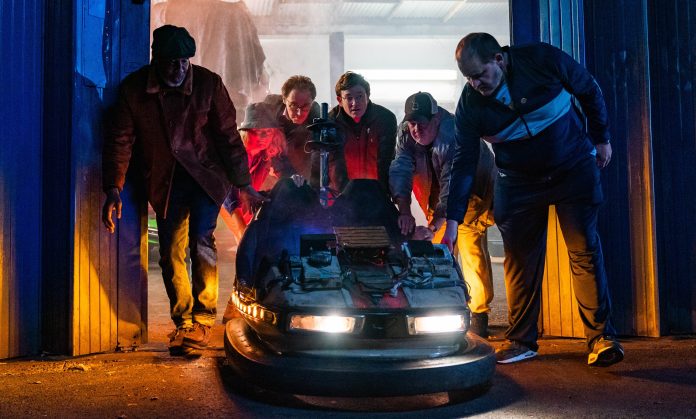by InTrieste
The 24th edition of the Trieste Science+Fiction Festival, Italy’s premier celebration of the science fiction genre, is set to return from October 29 to November 3, 2024. The highly anticipated festival, which has grown into one of Europe’s most important genre events, will showcase a lineup of films that delve into some of the most pressing issues of our time: from the dangers of Artificial Intelligence to the looming threat of climate change.
This year’s festival promises an array of Italian premieres, including films that explore these urgent themes through the lens of speculative fiction. From dystopian thrillers to fanta-horror, the selection offers a wide range of perspectives on the future, all rooted in the fantastical.
Opening Night and Festival Highlights
Kicking off the festival is MADS, the latest film from French director David Moreau (Them, The Eye), a one-take fanta-horror that plunges an adolescent into a nightmarish and hallucinatory adventure. Following that, the festival will present a diverse slate of films, including:
- Infinite Summer by Miguel Llansò (Estonia, Spain), a thriller about emerging technologies that follows three young women as a meditation app leads them into a mysterious summer adventure.
- Time Travel is Dangerous by British director Chris Reading, a buddy movie about two friends who use a time machine to source items for their vintage shop, only to face unforeseen consequences.
- Escape from 21st Century by China’s Yang Li, a sci-fi Wuxia film in which three friends discover they can travel through time with a sneeze, leading them to a troubled future on a planet resembling Earth.
The festival will also feature Schirkoa: In Lies We Trust by Indian filmmaker Ishan Shukla, a dystopian tale of a society where citizens are forced to wear paper bags to suppress individuality, and Parvulos by Mexican director Isaac Ezban, a visually arresting film about three siblings surviving in a post-apocalyptic world.
A Reflection of Modern Fears
The selection of films at the Trieste Science+Fiction Festival reflects the anxieties of the present day. Alan Jones, the festival’s artistic director, explained, “From the advent of machines to the fears surrounding AI and the threats of climate change, science fiction remains the dominant genre where today’s social issues are reflected in a futuristic mirror.” He added, “Through cosmic allegories, these films comment on political themes like inequality and injustice.”
This year’s theme, BrAInstorm the MegaFuture, invites audiences to consider the far-reaching impact of these technological and environmental challenges. The films on offer, Jones noted, are intended to “provoke, entertain, shock, and amuse.”
A Storied Legacy in Genre Cinema
Founded in 2000, the Trieste Science+Fiction Festival has its roots in the historic Trieste International Science Fiction Film Festival, which ran from 1963 to 1982. The event has since grown into a leading platform for science fiction and fantasy in Europe, attracting both filmmakers and fans from around the world. Over the years, the festival has hosted renowned guests such as Neil Gaiman, Dario Argento, Terry Gilliam, and Christopher Lee.
This year’s films will compete for several prestigious awards, including the Asteroide Award and the Méliès d’argent, as well as the audience-voted The Begin Hotels prize.
As the festival prepares to celebrate its 61st year, it continues to be a cornerstone for speculative fiction in Europe, offering a space where filmmakers can use imagination to address the uncertainties of the future. The Trieste Science+Fiction Festival is organized by La Cappella Underground and is recognized by the Autonomous Region of Friuli Venezia Giulia for its contributions to the international cinematic landscape.
A Global Celebration of the Fantastic
With its rich history and a track record of discovering groundbreaking talent, the Trieste Science+Fiction Festival has become a vital event for genre cinema. Whether tackling the ethical dilemmas of AI or envisioning a world ravaged by climate change, the films showcased this year promise to spark conversations that resonate far beyond the festival’s Italian borders.
As Jones concludes, “These films represent our collective dreams and fears, offering us a way to confront the future through the power of imagination.”





























